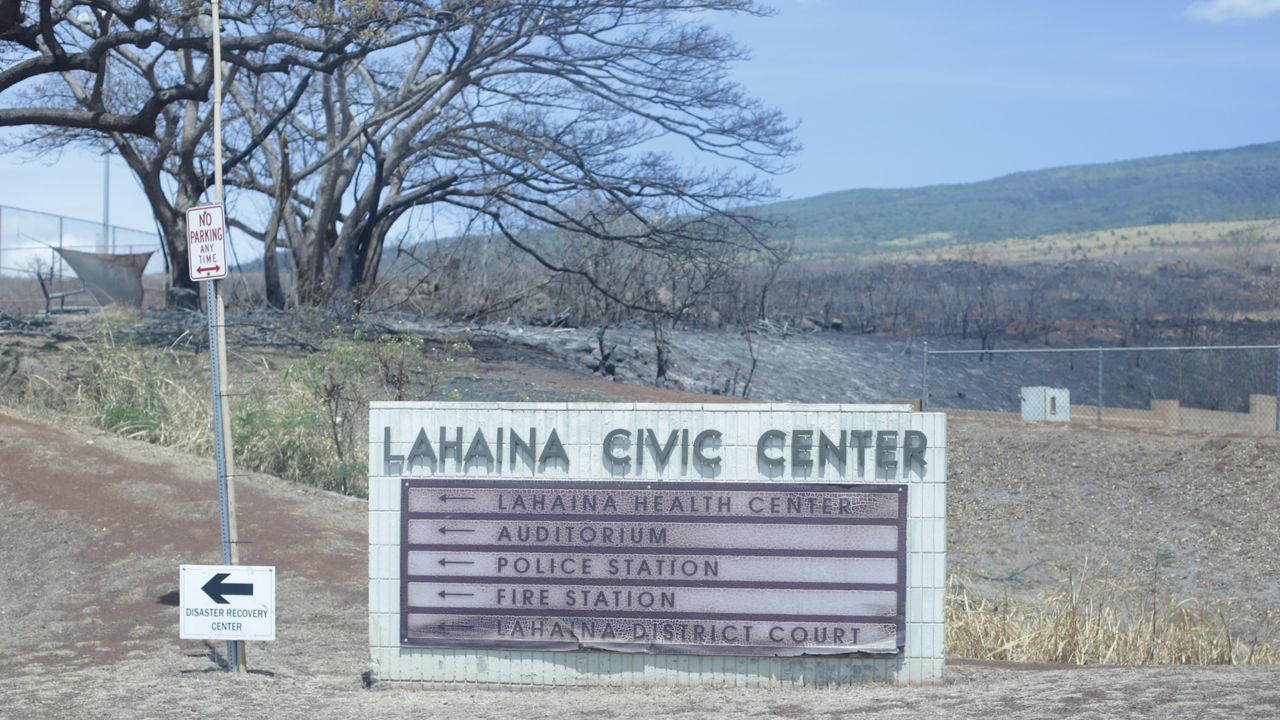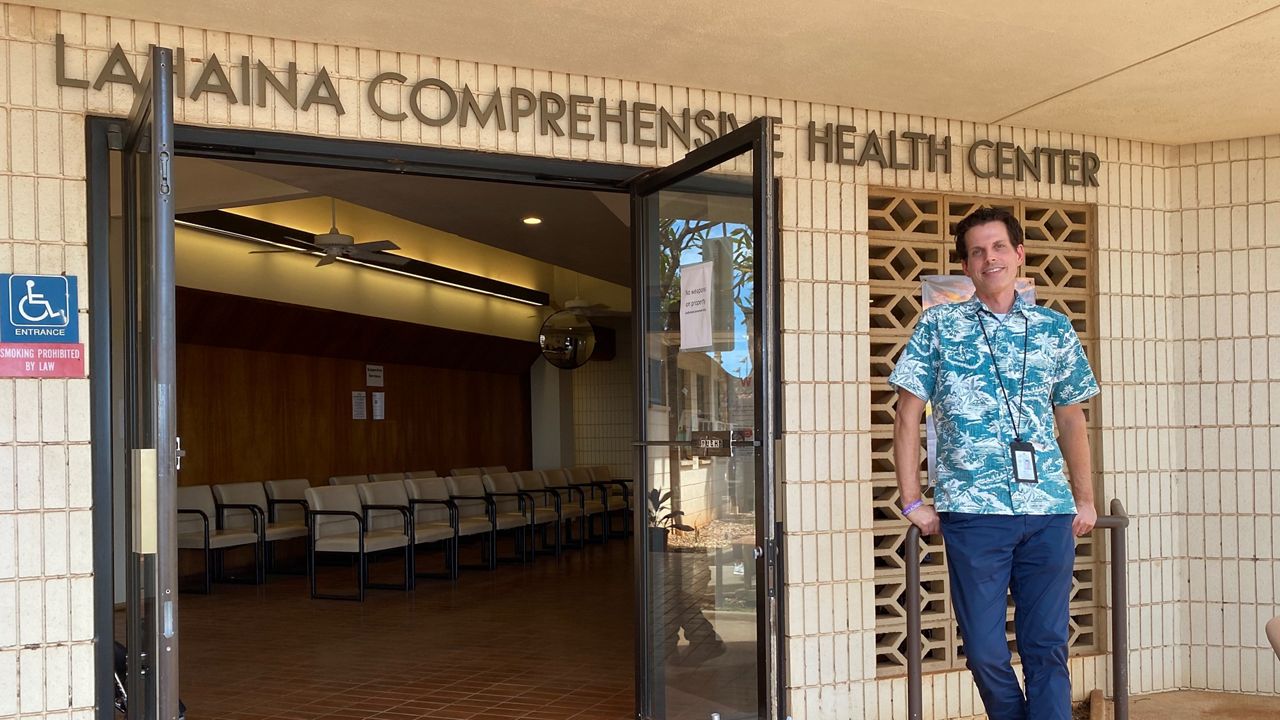LAHAINA, Hawaii — Behavioral health experts caution that in the first few months after the Aug. 8 Lahaina wildfire, survivors may not be aware of the mental toll the tragedy is having on them.
A survivor’s first instinct is to take care of basic needs: where to live and how to get food. They might also give much of their energy to caring for family members.
Maui's chief mental health administrator, John Oliver, explained it is only after survivors meet their basic needs they might look internally at their experience.
“Everybody's different … and the time it takes to process it is different,” Oliver said to Spectrum News.
He described the Lahaina community as resilient, but said it would still be a long road to recovery. Some people might need just a few counseling sessions to feel like they have a path forward, while for others it may take years or even be a lifelong journey.
Research done after California's 2018 Camp Fire, which killed 85 people, found a significant rise in posttraumatic stress disorder, anxiety and depression shortly after the disaster and often years later, a report by the University of Hawaii Economic Research Organization said. The report described the mental health of Maui wildfire survivors as “one of the biggest challenges.”
Adding to the challenge is the fact that many of Lahaina’s health care facilities — Kaiser Permanente's Lahaina Clinic, Malama I Ke Ola Health Center’s Lahaina location and several private practices — were destroyed in the fire.
One notable exception is the Lahaina Comprehensive Health Center. Located on Akoakoa Place, the health center sits on the northern edge of the fire-ravaged town. Across the street from the health center is a field of burned shrubs, bare branches and blackened dirt. In the median, a half-burnt banyan tree stands tall, with a mix of scorched and green leaves. Despite the fire’s proximity, the health center and the adjacent Lahaina Civic Center remain unscathed.
Behavioral therapists and counselors at the Lahaina Comprehensive Health Center are now helping people with the trauma they may experience in the wake of the fires. The Department of Health facility also provides resource guidance, assisting everyone from survivors who lost their homes to laid off hotel workers to figure out how to sign up for benefits.

When asked if it might be hard for people to come to a facility so close to where the fire occurred, Oliver said the location of the health center is important because it is accessible to the Lahaina community. More than 7,000 displaced residents are now staying in hotels or other temporary housing on Maui, and many of them are in nearby areas like Kaanapali. The health center’s services are free and they accept walk-ins. They have translation services for Japanese, Spanish, Tagalog, Ilocano, Chuukese, and other languages.
“It’s important to have a community presence,” said Oliver.
The Lahaina Comprehensive Health Center also has a mobile clinic that travels to neighborhoods from Leialii to Honokohau Valley.
“Our whole island is in pain, you can see that talking to anybody,” said Oliver.
Oliver says that he made many fond memories in Lahaina with his family and that losing a town he loves creates "a feeling of hopelessness." While he resides in Haiku, Oliver owned a condo in Lahaina, which burned down. The loss of his condo and the belongings he had inside also created a feeling “of being out of control of what you ordinarily had control of in your life.”
Many people will experience trauma because of the fires and everyone’s feelings are valid, said Oliver. This includes those that may experience the fire secondhand through stories told by friends, the news or social media. For some, the fires may trigger feelings about past traumas; a veteran might be reminded of a wartime experience in Iraq or Afghanistan.
“Maui has always been considered a true healing place. And so it's always had individuals gravitate to move here for that reason. And many of those individuals experienced prior trauma before coming here from the continent,” said Oliver.
First responders and their family members might also seek support because of the fires. For firefighters, police officers and other first responders, this disaster and its aftermath is likely to be more disturbing than what they are used to seeing while working their jobs.
Oliver, who is the father of two teenagers, encouraged parents to talk to their children about the fires.
“We live in such a social media environment that you're pretty much guaranteed that if you've seen something on social media, then your keiki have too. And so it's important to talk about what's happening in current events,” said Oliver.
Anyone 14 years or older can also see a mental health professional without parental consent.
For children who are ages 3 to 8, Oliver recommended a book called “There Was A Fire” by Liz Hartline. The author and Honolulu Community College professor wrote the book the day after the Lahaina fire to help children on Maui cope and let them know it’s ok to feel sad. Oliver said the book would help parents have a conversation about what happened with their children.
People should also keep an eye on their friends or loved ones who were impacted by the fires. Oliver said to be mindful of people becoming withdrawn, having mood swings, or talking about harming themselves. Sometimes people of older generations might not feel comfortable seeking mental health services, and Oliver encouraged grandchildren to bring their grandparents to the health center.
“It's really important to reach out for help and to get counseling,” said Oliver.
People impacted by trauma are encouraged to call the Lahaina Comprehensive Health Center at 808-586-4468, which is open daily from 9 a.m. to 4 p.m. The Department of Health also offers free behavioral health services in Wailuku at the Maui Community Mental Health Clinic. The clinic is open Monday to Friday from 7:45 a.m. to 4:30 p.m. Call 808-984-2150 for more information. For 24/7 support, call or text 988 and talk to a local representative.
The Lahaina Comprehensive Health Center is also seeking volunteers for mental health, such as licensed social workers, marriage and family therapists or clinical psychologists.
“There is probably going to be a really big need for counseling support,” said Oliver.
Michelle Broder Van Dyke covers the Hawaiian Islands for Spectrum News Hawaii. Email her at michelle.brodervandyke@charter.com.





